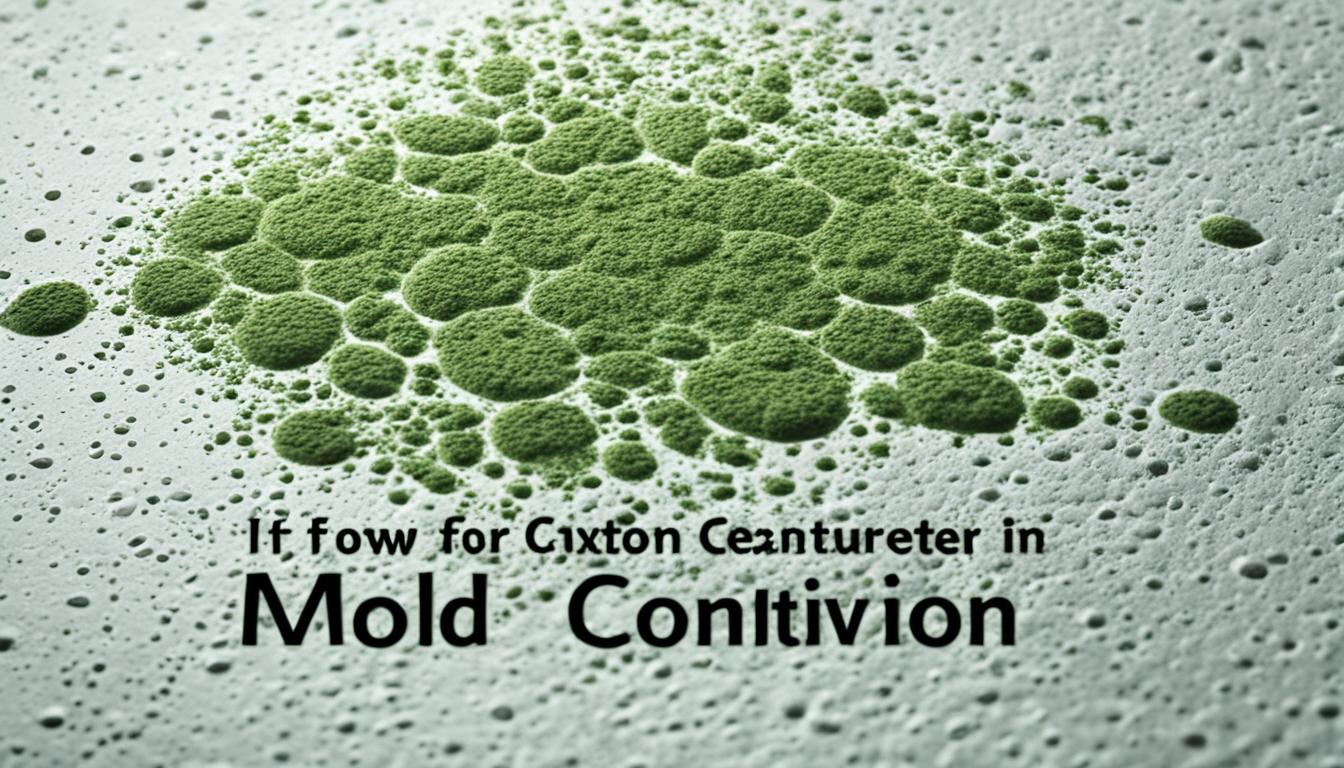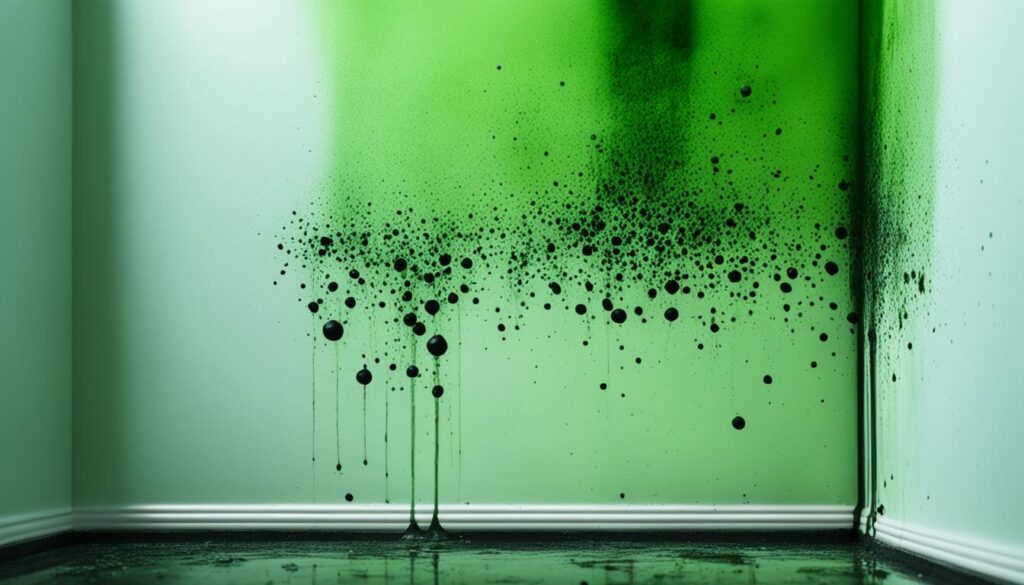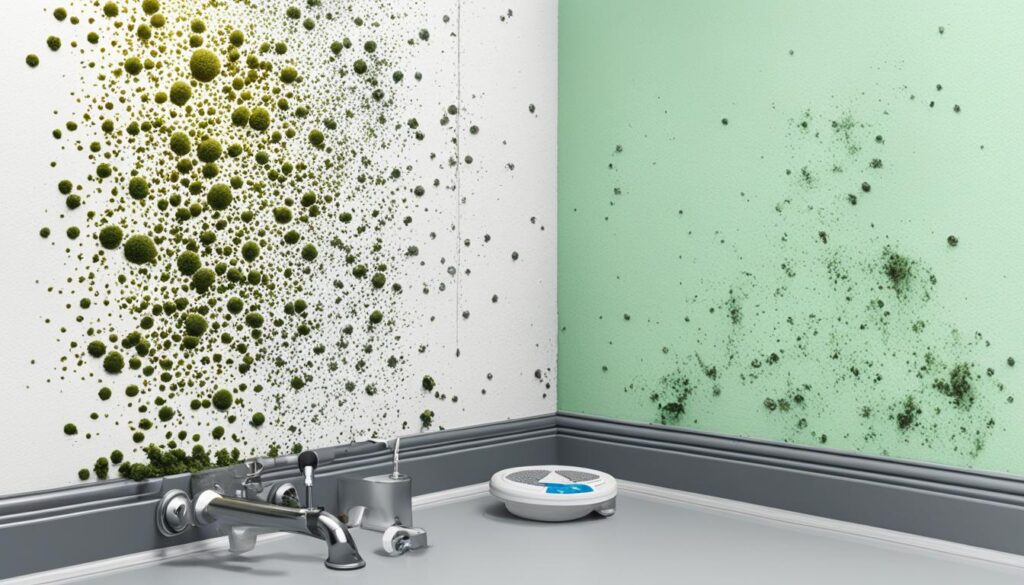
Mold Toxin Florida: Health Risks & Prevention Tips
Welcome to our comprehensive guide on mold toxin exposure in Florida. In this section, we will explore the health risks associated with mold toxins and provide valuable prevention tips to help you protect your home and family.
Mold toxins are a common concern in Florida due to the warm and humid climate, which creates an ideal environment for mold growth. Exposure to mold toxins can lead to various health issues, ranging from mild allergic reactions to more severe respiratory problems.
It is essential to be aware of the potential health risks associated with mold toxin exposure and take proactive measures to prevent their occurrence in your living spaces. By implementing the right prevention strategies, you can maintain a safe and healthy environment for yourself and your loved ones.
Key Takeaways:
- Florida’s warm and humid climate makes it prone to mold growth and mold toxin exposure.
- Mold toxin exposure can lead to various health issues, including allergies and respiratory problems.
- Prevention is key in minimizing mold toxin exposure, such as maintaining proper ventilation and controlling humidity levels.
- Regularly inspecting and addressing any signs of water leaks or moisture issues can prevent mold growth and toxin accumulation.
- Seek professional assistance for thorough mold inspection and remediation if you suspect a significant mold problem in your home.
Understanding Mold Toxin Exposure in Florida
Mold toxin exposure is a significant concern, especially in a state like Florida where the humid climate creates the perfect breeding ground for mold growth. In this section, we will explore the specifics of mold toxin exposure in Florida, including the common sources and factors that contribute to its presence. By understanding the impact of mold toxins on your health, you can take appropriate measures to protect yourself and your loved ones.
Common Sources of Mold Toxin Exposure
Mold can be found both indoors and outdoors, but indoor mold growth is often the result of moisture problems or water damage. Some common sources of mold toxin exposure in Florida include:
- Damp basements or crawl spaces
- Leaking pipes or plumbing issues
- Roof leaks or water intrusion
- Flooding or water damage
- Poor ventilation in bathrooms or kitchens
Factors Contributing to Mold Toxin Presence
Several factors contribute to the presence of mold toxins in Florida:
- High humidity levels: Florida’s warm and humid climate creates an environment where mold thrives. Excess moisture in the air can lead to increased mold growth and toxin production.
- Building materials: Some building materials used in Florida homes, such as drywall and wood, are susceptible to mold growth when exposed to moisture. Poor construction practices and inadequate insulation can also promote mold growth.
- Regular rainfall and hurricanes: Florida experiences heavy rainfall and hurricanes, which can cause water damage and flooding. These events provide ideal conditions for mold growth and toxin production.
Being aware of these sources and factors can help you identify potential areas of concern in your home and take appropriate actions to prevent mold growth and toxin exposure.
Mold Toxin Exposure and Health Risks
Exposure to mold toxins can have adverse effects on your health, particularly for individuals with pre-existing respiratory conditions, allergies, or weakened immune systems.
When mold spores and mycotoxins are inhaled or come into direct contact with the skin, they can cause a range of health issues, including:
- Allergic reactions: Some individuals may develop allergic symptoms such as sneezing, coughing, wheezing, watery eyes, and skin irritation.
- Respiratory problems: Prolonged exposure to mold toxins can exacerbate respiratory conditions like asthma and bronchitis, leading to difficulty breathing, chest tightness, and increased risk of respiratory infections.
- Neurological symptoms: Certain types of mold toxins, such as those produced by Stachybotrys chartarum (also known as black mold), may cause neurological symptoms such as headaches, dizziness, and difficulty concentrating.
It is important to note that the severity of health effects can vary depending on the individual, the type of mold toxin, and the duration and intensity of exposure. If you suspect mold toxin exposure in your home or experience unexplained health issues, it is advisable to seek professional help for proper assessment and remediation.

Prevention and Remediation of Mold Toxin in Florida
When it comes to dealing with mold toxins in Florida, prevention and remediation are key. By taking proactive measures to create a mold-free environment and addressing any existing mold issues, you can protect yourself and your loved ones from the health risks associated with mold toxin exposure.
Prevention Tips
Preventing mold growth in your home starts with controlling moisture. Here are some practical tips to help you prevent the formation of mold:
- Maintain proper ventilation: Ensure good airflow by using exhaust fans in kitchens, bathrooms, and laundry rooms. Proper ventilation helps to reduce moisture levels and prevent mold growth.
- Fix leaks promptly: Repair any leaks in your plumbing, roof, or windows as soon as possible. Moisture from leaks can quickly lead to mold growth if left unaddressed.
- Control indoor humidity: Keep indoor humidity levels below 50% to discourage mold growth. Use a dehumidifier if necessary, especially in humid areas or during damp seasons.
- Monitor and address condensation: Check windows, pipes, and other areas prone to condensation regularly. Wipe away any moisture promptly and ensure proper insulation to prevent condensation buildup.
- Use mold-resistant materials: When renovating or building, choose mold-resistant materials such as drywall, paint, and insulation to reduce the risk of mold growth.
Remediation Techniques
If you discover mold in your home, it’s essential to address it promptly and effectively. Here are some remediation techniques to consider:
- Identify and fix the source: Determine the cause of the mold growth and fix any underlying issues, such as leaks or excess moisture.
- Consult with professionals: For extensive mold infestations or if you’re unsure how to handle it, consult with experienced mold remediation specialists. They have the expertise and equipment to safely and effectively remove mold.
- Containment: Isolate the affected area to prevent the spread of mold spores. Use plastic sheets and seal off doors and ventilation openings.
- Proper cleaning: Use effective cleaning solutions, such as a mixture of water and detergent, or commercial mold cleaners, to scrub mold-infested surfaces. Remember to wear protective gear like gloves, goggles, and a mask to avoid inhalation.
- Dispose of contaminated materials: Discard heavily mold-infested materials that cannot be salvaged, such as carpets, wallpapers, and insulation.
- Ensure thorough drying: After cleaning, dry the area completely to prevent moisture and mold recurrence. Use fans, dehumidifiers, and open windows to promote airflow.
Remember, remediation is not just about removing visible mold. It’s also important to address the underlying cause and create a mold-resistant environment to prevent future growth.
To ensure effective prevention and remediation, it’s advisable to seek professional assistance if you’re dealing with extensive mold issues or if you’re uncertain about the proper remediation procedures. They can help you assess the situation, provide expert advice, and ensure that all necessary steps are taken to mitigate the risk of mold toxin exposure in your Florida home.

Conclusion
In conclusion, mold toxin exposure poses significant health risks that should not be overlooked. Mold toxins can trigger various respiratory symptoms such as coughing, wheezing, and shortness of breath. Prolonged exposure can even lead to more severe conditions like asthma and allergic reactions.
To ensure a safe and healthy living space in Florida, it is crucial to implement prevention tips such as controlling humidity levels, fixing leaks promptly, and improving ventilation in areas prone to moisture. Regularly inspecting and cleaning the house, especially in areas with high moisture content, can also help prevent mold growth.
If you suspect mold toxin presence or experience persistent health issues related to mold exposure, it is essential to seek professional assistance without delay. Professional mold remediation services can effectively identify and remove mold from your home, ensuring the elimination of potential health hazards.
By taking proactive measures to prevent mold growth and promptly addressing any signs of mold toxin presence, you can create a mold-free environment for you and your family. Prioritizing mold prevention and seeking professional help when needed will provide peace of mind and contribute to a healthier indoor living environment in Florida.




